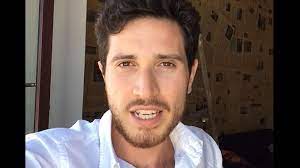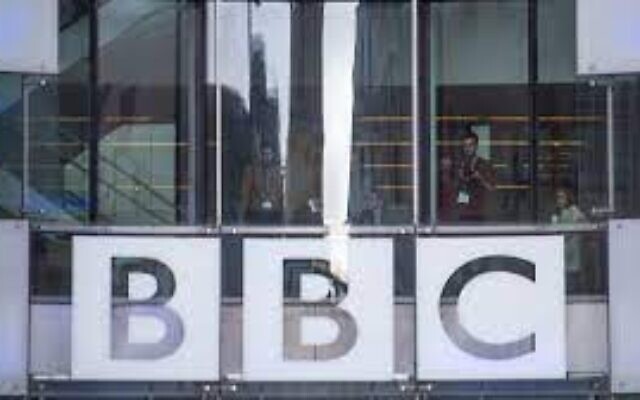BBC antisemitism row erupts after exec hugged film-maker who chanted ‘From the river to the sea’
Several Jewish and Israeli producers and directors walked out of the International Documentary Festival Amsterdam
Jenni Frazer is a freelance journalist
A new BBC antisemitism row has broken out after one of the broadcaster’s senior executives for Storyville hugged a Palestinian film-maker on stage at the conclusion of a speech which included the chant “from the river to the sea, Palestine will be free”.
The furore erupted at IDFA, the International Documentary Festival Amsterdam, the biggest documentary film festival in the world. It is regularly attended by film and TV executives seeking to buy films.
But one highly regarded Jewish Canadian film-maker, Francine Zuckerman, told Jewish News that she “would never go back” to IDFA after hearing what she described as Mohammed Almughanni’s “rant” — including a pledge “to take Haifa back”. After the BBC executive, Emma Hindley, embraced Almughanni on stage, Ms Zuckerman was among a number of Jewish and Israeli producers and directors who walked out of the event. She said she had been reduced to tears by what she had witnessed.

Ms Zuckerman, speaking from her home in Toronto, told Jewish News that she was appalled by Almughanni’s remarks and said she “could not believe that people do not understand what ‘from the river to the sea’ means. Everybody applauded when he said that. Perhaps 10 year-olds might not get it, but these were hopefully informed, educated people”.
She said: “This was an opportunity for us as film-makers to pitch our projects and to get support from the commissioning editors and the funders in the room. This wasn’t about having a rant or taking a political position”.
She said she was “very disappointed” to see the BBC Storyville executive embracing Almughanni, calling Emma Hindley’s action “inappropriate and biased”.
Almughanni was speaking after winning €1,500 IDFA Forum award for best pitch for his film Son of the Streets, about a stateless Palestinian boy in a Beirut refugee camp. He had given notice the previous evening that he intended to make a statement, but it appears that nobody was prepared for what he eventually said. Eyewitnesses told Jewish News that at one point he told those present that if they did not agree with him about Palestine, “I don’t want your money”.
His film was commissioned by the BBC’s Storyville strand. Lucie Kon, the commissioning editor for the film, who is Jewish, was not on stage when Almughanni spoke.
The BBC was criticised by a number of documentary film insiders — almost all of whom asked for anonymity — who claimed that Emma Hindley’s action breached the corporation’s impartiality. One told Jewish News: “Working at the BBC at the moment is soul-destroying. It is a very hostile and difficult environment. Emma could have consoled him in private if she wanted to. She did not have to kiss and cuddle him in public. She was on the stage because she is angry about what Israel is doing.”
A BBC spokesperson said: “We recognise that this is an incredibly distressing time for all those impacted by the ongoing conflict. Son of the Streets was commissioned by Storyville in 2022 and Emma Hindley was on stage in her capacity as series commissioner. Emma’s actions were a human response to the director, Mohammed Almughanni, who became visibly distressed during the pitch and were not in any way an endorsement of his views.
Emma Hindley herself, in a statement issued through the BBC press office, said: “I hugged Mohammed because he was visibly distressed. Hugging him wasn’t a political statement or an endorsement of anybody’s views, it was an instinctive human reaction. I’m sorry if my actions have upset anyone — my intentions were quite the opposite.”
BBC Storyville commissioned Son of the Streets last year, and also backed two other films at IDFA — one by an Israeli director and one by a Ukrainian director.
In a lengthy statement, a group of “Israeli and Jewish people working with BBC Storyville”, said that Almughanni had “labelled the conflict between Israel and Hamas as genocide, disregarding the context of the initial attack by Hamas that led to the murder of over 1200 people and kidnapping of over 200 people.
“What deeply disturbed us was the visible support extended by BBC executive Emma Hindley to the filmmaker, even after the use of offensive language. It is not common practice for commissioners to stand next to people pitching at IDFA. Emma Hindley is a senior leader at the BBC and should have known that her impartiality would be compromised, not just by standing next to the filmmaker, but by hugging and kissing him before and after his highly offensive statements.
“This support not only questions her impartiality, but also fosters an uncomfortable environment for Israeli and Jewish people attending the festival, and working with Storyville, promoting an atmosphere that may inadvertently contribute to antisemitism… This took place in a public event where people were cheering for harmful political agendas, including the eradication of Israel.
“As far as we know, the BBC is still supporting the director and his project and so the message is clear. The BBC is in no way impartial in all this. Coming to the festival shortly after the October 7 massacre, Israeli and Jewish industry members were in a sensitive emotional state. Experiencing a lack of support and encountering extreme opinions about the existence of our country made Israeli and Jewish attendees feel not only unsafe but unwanted at the festival”.
The BBC was approached for a comment from Lucie Kon but its spokesman said it had nothing further to add.

Thank you for helping to make Jewish News the leading source of news and opinion for the UK Jewish community. Today we're asking for your invaluable help to continue putting our community first in everything we do.
For as little as £5 a month you can help sustain the vital work we do in celebrating and standing up for Jewish life in Britain.
Jewish News holds our community together and keeps us connected. Like a synagogue, it’s where people turn to feel part of something bigger. It also proudly shows the rest of Britain the vibrancy and rich culture of modern Jewish life.
You can make a quick and easy one-off or monthly contribution of £5, £10, £20 or any other sum you’re comfortable with.
100% of your donation will help us continue celebrating our community, in all its dynamic diversity...
Engaging
Being a community platform means so much more than producing a newspaper and website. One of our proudest roles is media partnering with our invaluable charities to amplify the outstanding work they do to help us all.
Celebrating
There’s no shortage of oys in the world but Jewish News takes every opportunity to celebrate the joys too, through projects like Night of Heroes, 40 Under 40 and other compelling countdowns that make the community kvell with pride.
Pioneering
In the first collaboration between media outlets from different faiths, Jewish News worked with British Muslim TV and Church Times to produce a list of young activists leading the way on interfaith understanding.
Campaigning
Royal Mail issued a stamp honouring Holocaust hero Sir Nicholas Winton after a Jewish News campaign attracted more than 100,000 backers. Jewish Newsalso produces special editions of the paper highlighting pressing issues including mental health and Holocaust remembrance.
Easy access
In an age when news is readily accessible, Jewish News provides high-quality content free online and offline, removing any financial barriers to connecting people.
Voice of our community to wider society
The Jewish News team regularly appears on TV, radio and on the pages of the national press to comment on stories about the Jewish community. Easy access to the paper on the streets of London also means Jewish News provides an invaluable window into the community for the country at large.
We hope you agree all this is worth preserving.






















